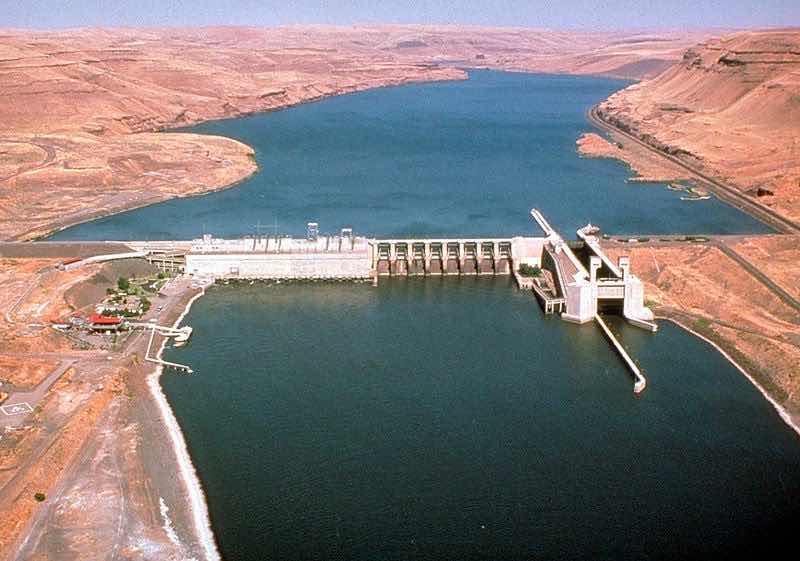forum
library
tutorial
contact

Tribes, Officials Sign Columbia River Basin
Agreement on Snake River Dams
by Matthew Weaver
Capital Press, February 23, 2024
|
the film forum library tutorial contact |

|
Tribes, Officials Sign Columbia River Basin
by Matthew Weaver
|
"Let's lean into the partnership and trust we have begun building."
-- Brenda Mallory, chair of White House Council on Environmental Quality.
Tribal representatives and the governors of Washington and Oregon met with federal officials at the White House on Feb. 23 to sign the Columbia River Basin Agreement, reached during mediation over a long-running lawsuit targeting Snake River dam operations.
The agreement outlines commitments made by the federal government and implemented through a memorandum of understanding between the U.S.; the states of Oregon and Washington; the Nez Perce, Umatilla, Warm Springs and Yakama tribes; and environmental nonprofit organizations.
"Let's lean into the partnership and trust we have begun building," said Brenda Mallory, chair of the White House Council on Environmental Quality. "With that, we will secure the vision that united many of us as we were striving forward, of securing a restored Columbia River Basin -- one that is teeming with wild fish, prosperous to tribal nations, having affordable clean energy, a strong agricultural economy and an upgraded transportation and recreation system. A healthy basin creates security and resilience for all...."
"It is quite something to see the tribes, states and federal government all working together in this way, and it is a process indeed worth celebrating," said Gerald Lewis, Yakama Nation tribal council chairman.
Several tribal leaders referred to the 1855 treaty with the federal government, securing exclusive rights to fish in their usual areas into perpetuity, and guaranteeing the availability of the fish for tribes to harvest.
"In our creation story, salmon gave up himself so we could have nourishment, and in return, we promised to speak on behalf of our resources," said Corinne Sams, a Confederated Tribes of the Umatilla Indian Reservation Board of Trustees member. "In the early days, our historic runs were over 20 million. Now, it's an estimated run this year of 124,000. We are on the brink of extinction, and status quo is unacceptable."
"Columbia Basin salmon are dying from the impacts of human development on our rivers, and our fishers have empty nets and our homes have empty tables, because historically the federal government has not done enough to mitigate these impacts," Lewis said.
 The last time energy was developed in the Columbia Basin, it was done "on the backs" of tribal communities and resources, Lewis said.
The last time energy was developed in the Columbia Basin, it was done "on the backs" of tribal communities and resources, Lewis said.
"Now we have an opportunity to do better," he said. "We need a lot more clean energy, but we need to develop it in a way that is socially just."
"We've got to defeat climate change to save the Columbia, because of water temperature issues," said Washington Gov. Jay Inslee. "We're doing habitat things, maintenance to the dams, but we've got to defeat climate change if we're going to save these fish in the Columbia River."
"The past is the past, but this is where we want to go," said Oregon Gov. Tina Kotek. "The science is clear: We must act if we are to make sure we have fish for future generations in the Columbia River."
"The fish are telling us how they're doing," said Rick Spinrad, under secretary of Commerce for Oceans and Atmosphere and National Oceanic and Atmospheric Administration administrator. "With the existential threat of climate change knocking at our doors, we need to stop expecting salmon to adapt to us."
NOAA has charted its course using the best science and information available, Spinrad said.
"Sometimes we don't need new data points, we need the right voices in the room to provide information and perspectives historically missing or excluded," he said.
"In a sense, this agreement really is just a handshake," said John Podesta, senior adviser to President Joe Biden on climate and energy. "It will take all of us committing to this partnership now and for years to come to lift the words off the page and bring this agreement to life."
None of the speakers mentioned breaching the lower Snake River dams. Tribal leaders and agricultural stakeholders have said the deal is a pathway to breaching. Authority to breach the dams remains with Congress.
Related Pages:
Vilsack on Snake River Dams: Ag 'Well-Represented' in Mediation by Matthew Weaver, Capital Press, 8/1/23
learn more on topics covered in the film
see the video
read the script
learn the songs
discussion forum
